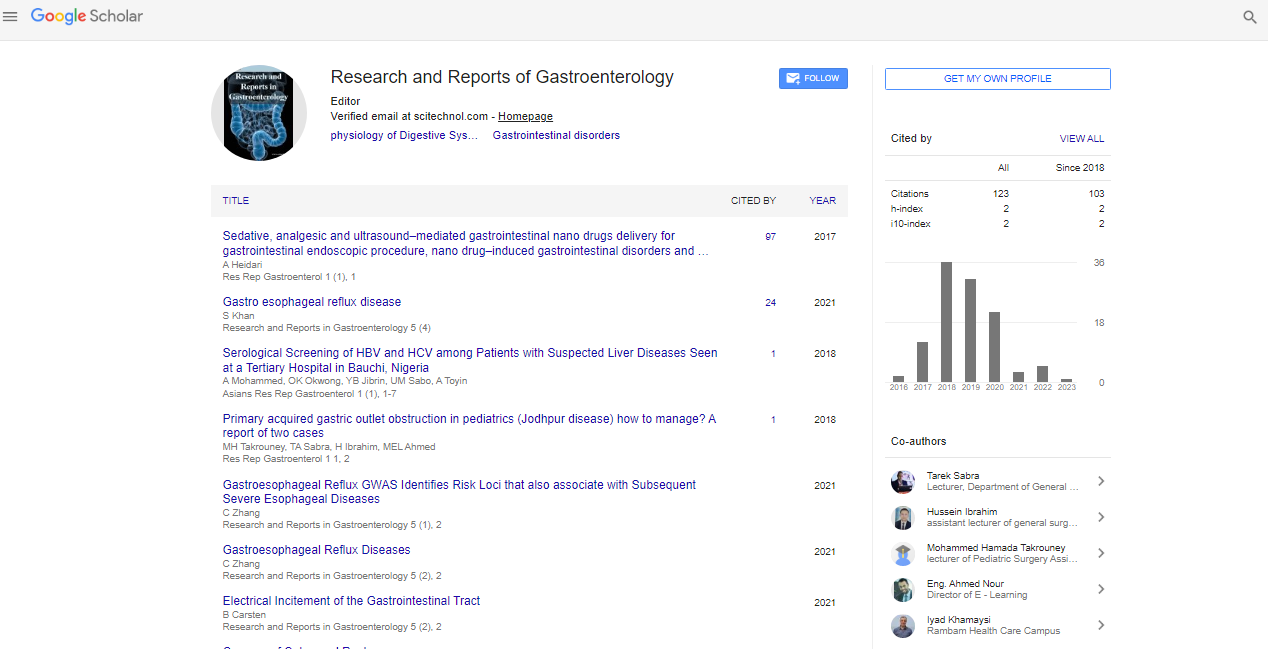Commentary, Res Rep Gastroenterol Vol: 7 Issue: 3
Intestinal Diseases: Examining the Complexities of Gastrointestinal Health
Michelle Baarle*
1Department of Chronic Diseases and Metabolism, Translational Research Center for Gastrointestinal Disorders, Leuven, Belgium
*Corresponding Author: Michelle Baarle,
Department of Chronic Diseases and
Metabolism, Translational Research Center for Gastrointestinal Disorders,
Leuven, Belgium
E-mail: baarlemichelle@gmail.com
Received date: 23 August, 2023, Manuscript No RRG-23-118433;
Editor assigned date: 25 August, 2023, PreQC No RRG-23-118433(PQ);
Reviewed date: 08 September, 2023, QC No RRG-23-118433;
Revised date: 15 September, 2023, Manuscript No RRG-23-118433 (R);
Published date: 22 September, 2023, DOI: 10.4172/Rrg.1000147
Citation: Baarle M (2023) Intestinal Diseases: Examining the Complexities of Gastrointestinal Health. Res Rep Gastroenterol 7:3.
Description
Intestinal diseases encompass a wide range of disorders affecting the digestive system, from inflammatory conditions to infections and structural abnormalities. Intestinal diseases represent a significant burden on global healthcare, affecting millions of individuals worldwide. These conditions can manifest as acute or chronic, mild or life-threatening, and they vary widely in their underlying causes. A comprehensive understanding of intestinal diseases is essential for healthcare providers, researchers, and patients to effectively diagnose, manage, and prevent them.
Anatomy of the intestines
The human digestive system comprises two primary components: the small intestine and the large intestine (colon). The small intestine, approximately 20 feet in length, plays a central role in nutrient absorption, while the large intestine, about 5 feet long, primarily absorbs water and forms stool.
Common intestinal diseases
Inflammatory Bowel Disease (IBD): IBD is a group of autoimmune disorders, including Crohn's disease and ulcerative colitis, characterized by chronic inflammation of the gastrointestinal tract. Symptoms may include abdominal pain, diarrhea, weight loss, and fatigue.
Irritable Bowel Syndrome (IBS): IBS is a functional gastrointestinal disorder, characterized by recurrent abdominal pain and altered bowel habits, without identifiable structural or biochemical abnormalities. It is a common condition with a wide range of symptom presentations.
Gastroenteritis: Gastroenteritis is the inflammation of the stomach and intestines, typically caused by viral or bacterial infections. It leads to symptoms like diarrhea, vomiting, abdominal cramps, and fever.
Celiac disease: Celiac disease is an autoimmune disorder triggered by the ingestion of gluten, a protein found in wheat, barley, and rye. It results in damage to the small intestine's lining and can cause malabsorption of nutrients.
Diverticulitis: Diverticulitis occurs when small pouches (diverticula) in the colon become inflamed or infected. This condition leads to abdominal pain, fever, and changes in bowel habits.
Etiology and risk factors
Intestinal diseases have diverse etiologies, often involving a complex interplay of genetic, environmental, and lifestyle factors. In the case of IBD, for instance, genetic predisposition, environmental triggers, and immune dysregulation contribute to disease development. Similarly, IBS is influenced by factors like diet, stress, and gut microbiota.
Clinical manifestations
The clinical presentation of intestinal diseases varies widely. Some patients may experience severe pain, diarrhea, and weight loss, while others might exhibit milder symptoms. The intensity and nature of symptoms often depend on the specific disease, its severity, and individual patient factors
Diagnosis and evaluation
Diagnosing intestinal diseases necessitates a comprehensive approach that includes medical history, physical examination, laboratory tests, and imaging studies. Endoscopic procedures, such as colonoscopy and upper endoscopy, play an important role in visualizing the gastrointestinal tract and obtaining biopsies for pathological evaluation.
Treatment and management
Treatment strategies for intestinal diseases aim to alleviate symptoms, reduce inflammation, and promote intestinal healing. The approach varies depending on the specific disease but may include:
• Anti-inflammatory drugs, immunosuppressants, antibiotics, and symptom management medications are commonly used.
• Dietary changes, stress management, and exercise can help improve the quality of life for patients with intestinal diseases.
• In some cases, surgical interventions are necessary to remove damaged or diseased segments of the intestines, particularly for conditions like Crohn's disease and diverticulitis.
Prevention and outlook
Preventative measures for intestinal diseases primarily focus on lifestyle and dietary factors. For example, a high-fiber diet may reduce the risk of diverticulitis, while gluten avoidance can prevent celiac disease in susceptible individuals. Ongoing research into the gut microbiome and its role in intestinal health may lead to new prevention and treatment strategies.
Intestinal diseases pose a significant challenge to patients, healthcare professionals, and researchers due to their complex etiologies, diverse clinical presentations, and potential long-term effects. A deeper understanding of the causes, diagnosis, and management of these conditions is essential to improve the quality of life for those affected and to develop more effective prevention and treatment strategies. Ongoing research in the field of intestinal diseases promises to provide new insights and therapeutic approaches, ultimately reducing the global burden of these conditions.
